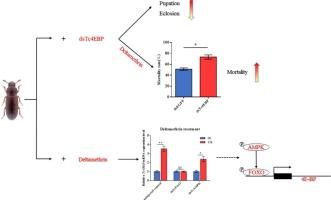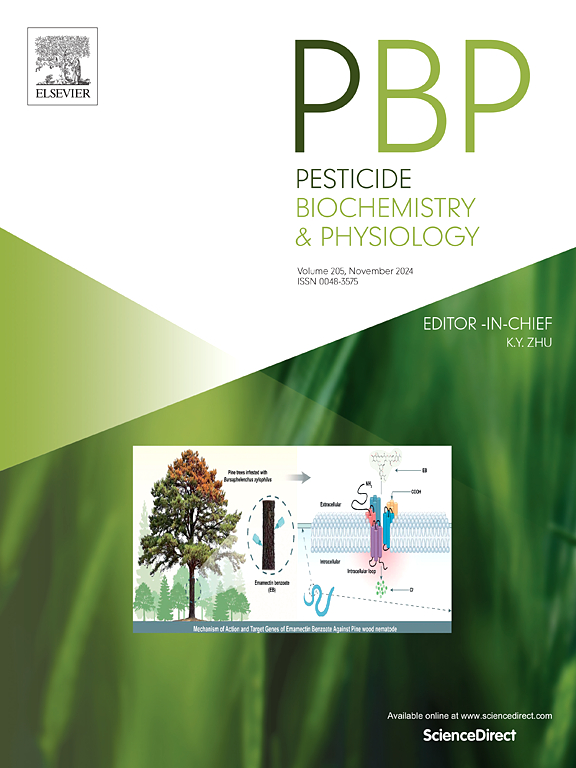AMPK-FOXO信号通路调控木栗4EBP对农药胁迫的转录反应
IF 4
1区 农林科学
Q2 BIOCHEMISTRY & MOLECULAR BIOLOGY
引用次数: 0
摘要
真核起始因子4e结合蛋白(4EBP)通过抑制帽依赖性翻译(细胞中最消耗能量的过程)来调节蛋白质合成。虽然4EBP的转录和翻译后调控在哺乳动物中已经得到了广泛的研究,但它在昆虫对农药胁迫的反应中的作用仍然知之甚少。在本研究中,我们鉴定并克隆了来自木犀草的Tc4EBP基因。RT-qPCR分析显示,Tc4EBP在幼虫期、蛹期和成虫期的表达量随发育时间的延长而增加。RNA干扰(RNAi)实验表明,通过注射dsRNA沉默Tc4EBP可降低瓢虫的化蛹率和羽化率。此外,溴氰菊酯处理显著诱导了Tc4EBP mRNA水平,敲低Tc4EBP显著增加了溴氰菊酯对甲虫的敏感性,并增强了溴氰菊酯诱导的ATP耗竭。值得注意的是,敲低TcFOXO和TcAMPKα显著下调Tc4EBP的表达水平,并减弱溴氰菊酯对Tc4EBP的诱导作用。此外,通过AMPK激活剂AICAR处理,TcFOXO的敲低阻止了Tc4EBP的诱导。本研究证实,Tc4EBP参与了甜菊的发育,TcAMPK-TcFOXO信号通路在溴氰菊酯处理下正向调节Tc4EBP转录,为其在农药胁迫下通过抑制翻译存活提供了证据。本文章由计算机程序翻译,如有差异,请以英文原文为准。

The AMPK-FOXO signaling regulates the transcriptional response of 4EBP to pesticide stress in Tribolium castaneum
The eukaryotic initiation factor 4E-binding protein (4EBP) regulates protein synthesis by suppressing cap-dependent translation, the most energy-consuming process in the cell. While transcriptional and post-translational modulation of 4EBP has been extensively studied in mammals, its roles in response to pesticide stress in insects remain poorly understood. In this study, we identified and cloned the Tc4EBP gene from Tribolium castaneum. RT-qPCR analysis revealed that the expression level of Tc4EBP increased with the development time during larval, pupal and adult stages. RNA interference (RNAi) experiment showed that silencing Tc4EBP through dsRNA injection decreased pupation and eclosion rates of the beetles. Additionally, the mRNA level of Tc4EBP was significantly induced by deltamethrin treatment, and knockdown of Tc4EBP significantly increased susceptibility of the beetles to deltamethrin and enhanced deltamethrin-induced ATP depletion. Notably, knockdown of TcFOXO and TcAMPKα significantly downregulated the expression level of Tc4EBP and attenuated its induction by deltamethrin. Furthermore, knockdown of TcFOXO prevented the induction of Tc4EBP by treatment with the AMPK activator AICAR. This study establishes Tc4EBP is involved in development of T. castaneum, and TcAMPK-TcFOXO signaling positively regulated Tc4EBP transcription in response to deltamethrin treatment, providing evidence of a survival strategy under pesticide stress via inhibition of translation.
求助全文
通过发布文献求助,成功后即可免费获取论文全文。
去求助
来源期刊
CiteScore
7.00
自引率
8.50%
发文量
238
审稿时长
4.2 months
期刊介绍:
Pesticide Biochemistry and Physiology publishes original scientific articles pertaining to the mode of action of plant protection agents such as insecticides, fungicides, herbicides, and similar compounds, including nonlethal pest control agents, biosynthesis of pheromones, hormones, and plant resistance agents. Manuscripts may include a biochemical, physiological, or molecular study for an understanding of comparative toxicology or selective toxicity of both target and nontarget organisms. Particular interest will be given to studies on the molecular biology of pest control, toxicology, and pesticide resistance.
Research Areas Emphasized Include the Biochemistry and Physiology of:
• Comparative toxicity
• Mode of action
• Pathophysiology
• Plant growth regulators
• Resistance
• Other effects of pesticides on both parasites and hosts.

 求助内容:
求助内容: 应助结果提醒方式:
应助结果提醒方式:


